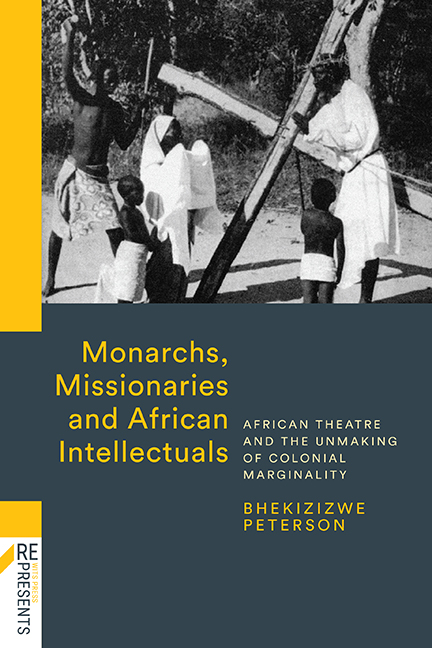 Monarchs, Missionaries and African Intellectuals
Monarchs, Missionaries and African Intellectuals Book contents
- Frontmatter
- Dedication
- Contents
- Preface and Acknowledgements
- Note on Zulu Orthography
- Introduction: Staging the (Alien)nation: African Theatre and the Colonial Experience
- 1 ‘All Work and No Play Makes Civilisation Unattractive to the Masses’: Theatre and Mission Education at Mariannhill
- 2 ‘I Will Open My Mouth in Parables’:Accounting for the Crevices in Redemption
- 3 Parallel Time, Parallel Signs, Discordant Interpretations
- 4 B.W. Vilakazi and the Poetics of the Mental War Zone
- 5 The Bantu Men’s Social Centre: Meeting the Devil on his own Ground
- 6 The Bantu Dramatic Society According to a Gossip Columnist
- 7 Contesting ‘The Bantu Imagination’: The British Drama League & The New Africans
- 8 H.I.E. Dhlomo: Measuring the Distance Between Armageddon and Revolution
- 9 ‘The Black Bulls’: Assembling the Broken Gourds
- 10 Hegemony and Identity: What a Difference ‘Play’ Makes
- Notes
- Bibliography
- Index
1 - ‘All Work and No Play Makes Civilisation Unattractive to the Masses’: Theatre and Mission Education at Mariannhill
Published online by Cambridge University Press: 12 October 2021
- Frontmatter
- Dedication
- Contents
- Preface and Acknowledgements
- Note on Zulu Orthography
- Introduction: Staging the (Alien)nation: African Theatre and the Colonial Experience
- 1 ‘All Work and No Play Makes Civilisation Unattractive to the Masses’: Theatre and Mission Education at Mariannhill
- 2 ‘I Will Open My Mouth in Parables’:Accounting for the Crevices in Redemption
- 3 Parallel Time, Parallel Signs, Discordant Interpretations
- 4 B.W. Vilakazi and the Poetics of the Mental War Zone
- 5 The Bantu Men’s Social Centre: Meeting the Devil on his own Ground
- 6 The Bantu Dramatic Society According to a Gossip Columnist
- 7 Contesting ‘The Bantu Imagination’: The British Drama League & The New Africans
- 8 H.I.E. Dhlomo: Measuring the Distance Between Armageddon and Revolution
- 9 ‘The Black Bulls’: Assembling the Broken Gourds
- 10 Hegemony and Identity: What a Difference ‘Play’ Makes
- Notes
- Bibliography
- Index
Summary
The Reverend Father Bernard Huss is one of the earliest and most influential pioneers in the social and pedagogical uses of theatre in South Africa. Between 1915 and 1927 Huss was the principal of St Francis College, Mariannhill, where he promoted the use of theatre in education and recreational activities with Africans. The students performed plays at St Francis, at the Native Location Hall at Depot Road in Durban, and at teacher training conferences. Huss was a popular speaker and received numerous invitations to address national forums on the ‘native question’. Where possible, Huss would combine speaking engagements with play-making exercises using participants who would perform scripted or improvised dramas. He was also a prolific writer and his ideas achieved a considerable measure of national currency.
The Mariannhill dramas and their attempts to make or contest hegemony are best appreciated against an understanding of the institutional ideas and processes that underpinned the social enactment of evangelism and the new colonial order. Missionaries seized the vocabularies of narrative and drama, including their textual strategies, and used them to realise evangelical aims. Huss acknowledged the theatricality of the Catholic practice of ‘placing before the minds of her children the lives of saintly men and women’ who ‘illuminate’ Christian teachings and their import for life. Furthermore:
the ritual or religious service abounds in suggestions through all the avenues of the senses, the architecture, decorations, statues, pictures, rites, ceremonies, reverent attitude, sermons, songs, music etc.; these things are suggestive of religious sentiment.
Consequently, evangelism was in many ways the quintessential melodramatic exercise where personal conduct and social events, even of the most ordinary kind, were emblematic of the battle with African epistemologies and cultures. The beliefs and powers of missions and colonial society had to be staged, not only in plays, but, significantly, in the spatial organisation of the mission, its architectural designs, work rhythms, religious rituals, and even the clothing that African converts wore. Mission education approximated a ‘machine of learning’ which, with its detailed daily programme and repetitive exercises, represented the wish to order ‘earthly time for the conquest of salvation’. The ideological vision was that evangelical authority could be demonstrated and exercised through the mission's mediation of space, time and discourse.
- Type
- Chapter
- Information
- Monarchs, Missionaries and African IntellectualsAfrican Theatre and the Unmaking of Colonial Marginality, pp. 23 - 44Publisher: Wits University PressPrint publication year: 2021


